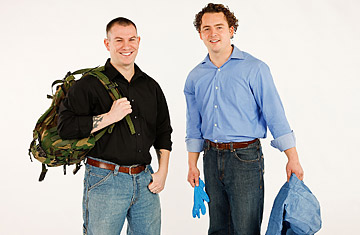
The Marines of Biotrauma Inc. Ben Lichtenwalner, left, and Ryan Sawyer
Benjamin Lichtenwalner was working as a cook in the Marine Corps when he got word that his unit's mission was about to change — drastically. He spent two tours in Iraq working in "mortuary affairs," a job that took him all over the country to search for, recover and clean up the remains of fallen soldiers — one of the most important and gruesome yet least talked-about military assignments. TIME spoke with Lichtenwalner about his experiences and why he and fellow Marine Ryan Sawyer decided to launch a company called Biotrauma Inc. in their native Georgia that performs similar tasks.
TIME: How did you first react to your unit's new mission?
Lichtenwalner: It was a shock, but of course, when I joined the Marine Corps, I anticipated having to be around death. I wasn't really crazy about being a cook, but when they switched our job up, I wasn't really crazy about doing [mortuary affairs] either. [Laughs.] But I was prepared to be around death, and once we got started, there was really no turning back. I realized just how important a mission Ryan and I both had. We kind of viewed it as a calling. Just like what we do now is our calling.
So tell me how they trained you guys.
One thing they did was send us to the Fulton County Medical Examiner's Office — that's the county that Atlanta, Ga., belongs to — and they had us view an autopsy. That got us acclimated to the gore that we see. Fulton County also has a decomp room where they store bodies that have been decomposing for any length of time. So we went to that room and got to smell the stench of death. That was like the initial kick in the butt. Then after that, we had a month of classroom training. We would do mock search-and-recoveries out in the woods, looking for fallen soldiers Stateside before we were deployed. (See "A TIME Photographer's Iraq Diary.")
What was it like when you first got to Iraq and you went on your first mission?
The first recovery that I went on — this was in '03 — it was in the city where Jessica Lynch was captured, Nasiriyah. What happened was you had two tanks rolling through the streets of this very crowded city. One tank was ambushed by insurgents, [and] the second tank called in for air support to quell the ambush. The plane that came in had a friendly-fire incident on the first tank, and 14 servicemen passed away.
So, what we had to do was go in, recover this tank and try to tentatively figure out who was in it and collect all the evidence. This was all done at a time when there were a lot of insurgents in the area. There were thousands of people on either side of the road, so we had to do crowd control in order to give ourselves room to do our work. We had the crowd pushing forward, so we had to push them back. And there were rooftops everywhere. It was a very sticky situation. But we ended up recovering the tank, and we were able to help identify all 14 fallen servicemen.
And how does that work?
We don't do any positive ID because we're not a laboratory. We're sort of like the field application for those guys. We'd go and collect any evidence we can — dog tags, nameplates, paperwork. You would think that it'd be so simple, but it's not always so simple. Some guy could have a name tape on his blouse that says "Jackson," but you know when you're out in Iraq, clothes can sometimes be hard to come by, so sometimes you'd get a buddy loaning his shirt to another buddy, and that guy could get shot and pass away, and then the name he's got on his shirt isn't necessarily the right one. So we would try to collect these clues and sort of hint at who they may be, but of course we couldn't do any DNA-testing. That happened back Stateside.
Did other soldiers treat your unit differently?
It was sort of funny that when we'd chat with other Marines in the chow hall and they'd ask what we did, they would sort of stop talking with us. I think it definitely made our unit closer.
Was there any sort of psychological training?
The psychological preparation really happens at boot camp. They pretty much prepare you for anything. If you're going to fail, you're going to do it there usually. But above that, there really was no psychological training. They put us in shock-value scenarios, like viewing those autopsies. They put us in front of that to gauge our reactions, and I think most everybody dealt with it pretty well. That being said, one thing we do back home at Biotrauma, we've identified the fact that stress has a cumulative effect on the body. We seem to be strong, or at least we tell ourselves that [laughs], and we haven't had any problems, but that's not to say something couldn't happen down the line. So we keep a real close eye on our employees.
Not too long ago, we were at a coroners convention and we were speaking with a funeral director, and he said that for 30 years he's been in the funeral business without incident. But a couple months back, he just woke up sweating and screaming, kind of freaked out his wife. It was late at night, and he had a nightmare about one of the guys he had embalmed earlier that day. That goes to show you how psychological stress can chip away at you over time.
